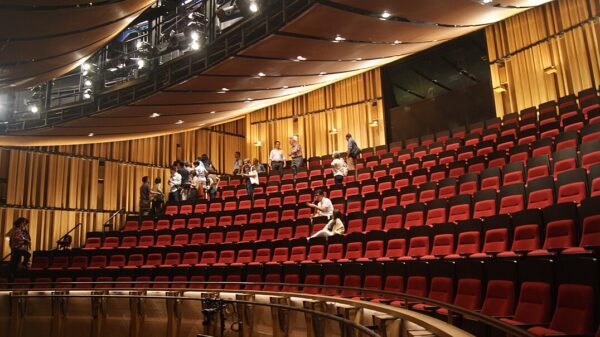Guest Writer Georgie Williams reviews the Almeida Theatre’s latest production of The Secret Life of Bees, taking a detailed look at the musical’s performance value and thematic execution.
It goes without saying that the best musical theatre productions should have a high standard of acting and a captivating script that works in harmony with the dancing, music and singing. The Secret Life of Bees has the latter three in abundance; we will talk about the acting and the script.
Originally a book by Sue Monk Kidd turned into a film, The Secret Life of Bees, takes place in South Carolina in 1964 and follows the story of a white young girl (Lily) abused by her father and the black family maid (Rosaleen) who is beaten and arrested for trying to register to vote. The pair runaway to a honey farm to evade law enforcement and Lily’s father. The pair find sanctuary at the farm with the three sisters who own it. They meet the black sisters, August (the matriarch), June (the kind but cold) and May (who is left traumatised as a result of her twin sister April’s suicide).
You cannot go to this production and not be amazed by the musical performances of the cast. The sound the cast makes moves your heart into your throat and covers your body with goosebumps. The song “Raise Me Up” was a soul altering experience. The score is a remarkable highlight and a testament to the cast and production team.
This was enhanced by the dynamic of the cast. The synergy between the actors on stage, especially in a theatre as small as the Alamaida, enabled the audience to feel that rare feeling brought about by pure theatrical excellence. I feel in particular the relationship between Lily and Roseleen was especially engaging and contrasted the more archetypal relationships of black and white characters seen on stage and screen. The equity in their presentation placed both Lily and Roseleen as central characters. A change to the original text that I think has deeply enriched the production. Essentially, as you see Roseleen endure horrific events, she is then not for the rest of the production a victim indebted to a ‘white saviour’. As well as this, the production is still able to avoid the trap of turning Rosaleen in into a stereotypical “strong black sassy sidekick”.
While there were some major achievements of characterisation, the script still left a lot to be desired. Any craftsmanship of characterisation clearly came from the actors, the weak script at times would often appear awkward and felt like the actors were salmon swimming against the current of the stream. Working hard for little effect. With a cast this good, if the script had been improved this would have been a better piece of theatre, you can’t build a castle on a week foundation. In particular, the frequent inclusion of stereotypical deep southern slang was a trail of Hercules that each actor had to endure. Of course, it’s necessary to place the characters in the time and place I feel that this could’ve been done with a more delicate and nuanced pen. It was hard not to cringe when the lead character Lilly referred to herself as a “Hot Potata who killed her mama”. This line actually characterised the flippancy of which some themes of the show was dealt with.
Earlier on in the show the central character Lily is being physically abused by her farther being forced to kneel on grits which was then followed by an upbeat folky song. The painfully jarring moment appeared to be another emblem of thematic flippancy.
It’s a raw story and there were changes to the original storyline which somewhat failed to portray the brutality of 1964 Deep South America. A key event in the book was that May commits suicide and this was absent from the production. I understand why this choice was made as it prevented May from being a victim of her situation. However, I feel by removing this from the plot it didn’t reflect the brutality of the environment, and as a result underplayed the cruelty that many endured. Misrepresentation to make an audience comfortable comes across disingenuous.
Would I have been as critical if I didn’t compare this production to the book and the film? Probably not. Yet, if you are going to take a source text as good as The Secret Life of Bees, then you need to do it justice in every element of the production and pay true homage to the people you are representing. The cast was bloody brilliant though.
King's College London. Award-winning student newspaper, a platform to share your story, and a publication that holds entities accountable when no one else dares.
















